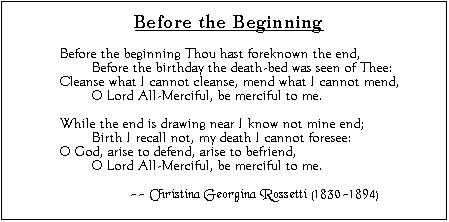

1Then Joseph could no longer control himself before all his attendants, and he cried out, "Make everyone leave my presence!" So there was no one with Joseph when he made himself known to his brothers. 2And he wept so loudly that the Egyptians heard him, and Pharaoh's household heard about it.3Joseph said to his brothers, "I am Joseph! Is my father still living?" But his brothers were not able to answer him, because they were terrified at his presence.
4Then Joseph said to his brothers, "Come close to me." When they had done so, he said, "I am your brother Joseph, the one you sold into Egypt! 5And now, do not be distressed and do not be angry with yourselves for selling me here, because it was to save lives that God sent me ahead of you. 6For two years now there has been famine in the land, and for the next five years there will not be plowing and reaping. 7But God sent me ahead of you to preserve for you a remnant on earth and to save your lives by a great deliverance.
8"So then, it was not you who sent me here, but God. He made me father to Pharaoh, lord of his entire household and ruler of all Egypt. 9Now hurry back to my father and say to him, `This is what your son Joseph says: God has made me lord of all Egypt. Come down to me; don't delay. 10You shall live in the region of Goshen and be near me--you, your children and grandchildren, your flocks and herds, and all you have. 11I will provide for you there, because five years of famine are still to come. Otherwise you and your household and all who belong to you will become destitute.'
12"You can see for yourselves, and so can my brother Benjamin, that it is really I who am speaking to you. 13Tell my father about all the honor accorded me in Egypt and about everything you have seen. And bring my father down here quickly."
14Then he threw his arms around his brother Benjamin and wept, and Benjamin embraced him, weeping. 15And he kissed all his brothers and wept over them. Afterwards his brothers talked with him.
16When the news reached Pharaoh's palace that Joseph's brothers had come, Pharaoh and all his officials were pleased. 17Pharaoh said to Joseph, "Tell your brothers, `Do this: Load your animals and return to the land of Canaan, 18and bring your father and your families back to me. I will give you the best of the land of Egypt and you can enjoy the fat of the land.'
19"You are also directed to tell them, `Do this: Take some carts from Egypt for your children and your wives, and get your father and come. 20Never mind about your belongings, because the best of all Egypt will be yours.'"
21So the sons of Israel did this. Joseph gave them carts, as Pharaoh had commanded, and he also gave them provisions for their journey. 22To each of them he gave new clothing, but to Benjamin he gave three hundred shekels of silver and five sets of clothes. 23And this is what he sent to his father: ten donkeys loaded with the best things of Egypt, and ten female donkeys loaded with grain and bread and other provisions for his journey. 24Then he sent his brothers away, and as they were leaving he said to them, "Don't quarrel on the way!"
25So they went up out of Egypt and came to their father Jacob in the land of Canaan. 26They told him, "Joseph is still alive! In fact, he is ruler of all Egypt." Jacob was stunned; he did not believe them. 27But when they told him everything Joseph had said to them, and when he saw the carts Joseph had sent to carry him back, the spirit of their father Jacob revived. 28And Israel said, "I'm convinced! My son Joseph is still alive. I will go and see him before I die."
At the end of the previous chapter, Judah gave a stirring speech to Joseph to appeal for the release of Benjamin (see Gen. 44:18-34). In it, Judah related to Joseph the pain that his father Jacob would endure if the brothers returned to him without Benjamin (see Gen. 44:30-31). Judah, of course, did not know that he was appealing to his own brother about the pain that their mutual father would experience. Judah's speech affected Joseph more than Judah could hope. Here in this chapter, we see the result of it: Joseph "wept so loudly that the Egyptians heard him" (vs. 1). Judah's speech convinced Joseph that his brothers had repented from their evil behavior of the past. It also convinced him that his brothers truly cared for Benjamin's and Jacob's well-being. Thus, Joseph was finished with his charade, and made his identity known to his brothers (mainly because he could no longer hold himself back): "I am Joseph! Is my father still living?" (vs. 3). Touching is Joseph's concern first for the welfare of his beloved father.
The revelation that Joseph was standing before them shocked the brothers: "But his brothers were not able to answer him, because they were terrified at his presence" (vs. 3). What would happen now? The fact that this powerful Egyptian ruler was their brother, whom they had sold into slavery, certainly was not an immediate comfort to them. For, if they feared Joseph before, they certainly would fear him now that they knew that Joseph had reason to punish them.
Joseph immediately set to assure them that they were in no danger. He said, with (I am sure) a loving tone: "Come close to me" (vs. 4). Then he told them what had happened since he was sold into slavery (see vss. 5-11). At the end of his speech, he "threw his arms around his brother Benjamin and wept,... and he kissed all his brothers and wept over them" (vs. 14). Joseph displayed his forgiveness of his brothers, by embracing all of his brothers, even the ringleaders who wanted to murder him many years before. Joseph's demonstration of love and forgiveness achieved the desired effect of comforting his brothers, for "afterwards his brothers talked with him" (vs. 15).
In recounting to his brothers what had happened to him, Joseph told the history from God's point of view, not from man's point of view: "And now, do not be distressed and do not be angry with yourselves for selling me here, because it was to save lives that God sent me ahead of you. For two years now there has been famine in the land, and for the next five years there will not be plowing and reaping. But God sent me ahead of you to preserve for you a remnant on earth and to save your lives by a great deliverance. So then, it was not you who sent me here, but God. He made me father to Pharaoh, lord of his entire household and ruler of all Egypt" (vss. 5-8). Joseph spoke in the spirit of forgiveness because his brothers had repented from their sin. In this spirit, he sought to comfort them, saying, "[D]o not be distressed and do not be angry with yourselves for selling me here" (vs. 5). Note here the blessings of repentance versus the judgment of stubborn resistance. If the brothers had resisted the tug of their consciences to repent from their sin, they would have continued under the wrath of the second-in-command in Egypt. We can take this as a lesson. So many people, in their stubbornness, resist repenting from their sins, despite constant pressure to do so by their consciences. They continue in misery rather than humble themselves and turn to God for forgiveness. Oh, if they would just kneel before God, ask His forgiveness, and accept the cleansing from their sin that is available through Jesus Christ! Then they would know the joy of forgiveness and the glory of salvation.
To further comfort his brothers, Joseph informed them that, by God's great wisdom, He used their evil actions to effect a good result: "Do not be angry with yourselves for selling me here, because it was to save lives that God sent me ahead of you... But God sent me ahead of you to preserve for you a remnant on earth and to save your lives by a great deliverance" (vss. 5,7). God, in His (literally) infinite wisdom, directed the events to bring about the salvation of His chosen family. Recall that, originally, the brothers were going to kill Joseph (see Gen. 37:20). But then God used, first, Reuben to convince the brothers to just throw Joseph into the cistern (rather than kill him first, see Gen. 37:22), then God used Judah to convince the brothers to sell Joseph rather than to leave him in the cistern to die (see Gen. 37:26,27). Thus, Joseph says: "So then, it was not you who sent me here, but God" (vs. 8). God was able to direct the actions of the brothers to further His will, even though the intentions of the brothers were evil. God did this in such a way so as to not Himself take part in the evil. If anything, God lessened the evil of the situation by directing the brothers away from the murder that they intended to commit.
Joseph also told his brothers: "Now hurry back to my father and say to him, `This is what your son Joseph says: God has made me lord of all Egypt. Come down to me; don't delay'" (vs. 9). Pharaoh, a true friend of Joseph's, generously supported Joseph's plan to bring his whole family to Egypt: "When the news reached Pharaoh's palace that Joseph's brothers had come, Pharaoh and all his officials were pleased. Pharaoh said to Joseph, `Tell your brothers, "Do this: Load your animals and return to the land of Canaan, and bring your father and your families back to me. I will give you the best of the land of Egypt and you can enjoy the fat of the land." You are also directed to tell them, "Do this: Take some carts from Egypt for your children and your wives, and get your father and come. Never mind about your belongings, because the best of all Egypt will be yours."'" (vss. 16-20).
Joseph and the brothers did as Pharaoh said and returned to Canaan to bring Jacob to Egypt. Note the touch of humor in Joseph's parting words to his brothers: "Don't quarrel on the way!" (vs. 24). When the brothers returned home, Jacob certainly had reason to be "stunned" as the brothers told him: "Joseph is still alive! In fact, he is ruler of all Egypt" (vs. 26). Jacob did not believe his sons' unbelievable story, at first (who would?). "But when they told him everything Joseph had said to them, and when he saw the carts Joseph had sent to carry him back, the spirit of their father Jacob revived. And Israel said, `I'm convinced!'" (vs. 27-28). Note here that, as is Moses' style, when Jacob acts in faith, he is referred to as "Israel" (the name God had given him).
